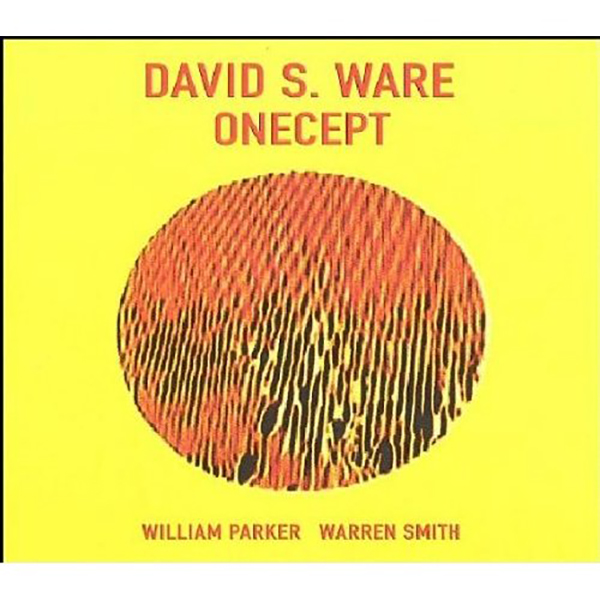
by Tim Owen
February 09, 2011
/ ALBUM
Coming late in 2010, the release of "Onecept" was perhaps the most welcome of the year.
David S. Ware
Onecept
(Aum Fidelity)
Coming late in 2010, the release of “Onecept” was perhaps the most welcome of the year. Reunited with all but one of the personnel from his last group recording (“Shakti”, 2008, which additionally featured guitarist Joe Morris), David S. Ware is on fine form, having overcome considerable odds to recover from a life-saving lung transplant operation. Ware had been on dialysis for years, but his health declined and he underwent surgery sometime after the recording of “Shakti”. Incredibly he returned to live performance as early as October 2009, in a solo concert that was captured for posterity on “Saturnian”; in December of the same year he returned to the studio to record “Onecept”. The album is a fittingly masterful celebration of not only Ware’s vital fortitude but also what the sticker superimposed on the CDs cover art declares his “50th year of saxophone artistry” (which makes his first year of artistry his tenth, though he wouldn’t get to record until age 21, in 1971).
In an interview reproduced in the album’s liner notes, Ware responds to the question “where is your music on the saxophone at now?” with the assertion that it’s all about “mastery?What the fingers, what the sense of touch and the sense of hearing are able to do?how quickly can the fingers do what the musical mind conceives of”. In fact the music on “Onecept” proves that there’s much more to Ware’s approach than either this assertion, or his no-nonsense conception of the saxophone as “a mechanical thing” might allow. Perhaps it’s something more to do with his perception of consciousness “collapsing on time and space and head(ing) toward the 4th dimension”; who knows?
It might surprise fans of the brace of albums Ware recorded for the predominantly hardcore rock label Homestead in the mid-90’s, on which Ware displays a compacted and rather daunting ferocity in marked contrast to the more considered and stylistically varied fare on offer on his concurrent DIW recordings, but “Oncept” is his first entirely improvised outing (though I note how Ware gets sole credit on all compositions). This might also surprise anyone who hears “Onecept” without knowing it, since the nine tracks it contains are concise and supremely controlled, making the album eminently listenable. It also offers a great deal of tonal variation, which makes it ideal for anyone looking for a point of entry to Ware’s now considerable body of work.
Early on in “Astral Earth”, the album’s fulcrum and its longest piece at just under 15 minutes, Ware hints at the melody of “Inflated Tear”, the signature tune of that great multi-reed instrumentalist, Rahsaan Roland Kirk. It’s a telling allusion. Ware is indelibly associated with the tenor saxophone, and unlike certain other artists?his close contemporary David Murray foremost among them?Ware has been practically single-minded in his stylistic approach. Notwithstanding either his gobsmacking exercise in circular breathing on Earthquation’s “Ideational Blue”, and the respectfully recast jazz standards that stud his DIW and Columbia recordings, Ware tends to shape his lines from series of short, forceful lung-bursts (it’s now almost impossible not to reflect on the cruel irony of Ware’s recent illness while listening to his music). So it’s notable that, albeit there’s no kalimba on this album (as on Shakti’s “Namah”), Ware plays his signature tenor on only three of its nine tracks, and stritch and saxello on three others apiece. He remains supremely himself regardless of what he’s blowing, yet the effects of his instrumental selectivity are subtle but telling. The thinner, more limited tonal range of the saxello encourages Ware to concentrate on that rapid fingering, while the stritch has a warmer, blurrier sound, not unlike that of a clarinet, which brings out degrees of tenderness and hints of introspection.
“Onecept” isn’t all about David S. Ware. William Parker is long established as Ware’s essential right hand man, and new drummer Warren Smith has proven himself as a terrific partner to complete the trio, which I hope will continue to work together. I continue to regard the David S. Ware quartet with Matthew Shipp as one of the greats, but it played its last in 2006, and I feared Ware’s best might be behind him. One of the most remarkable things about that quartet was the way in which its series of drummers (first Marc Edwards, then Whit Dickey, Susie Ibarra, Hamid Drake and Guilermo E. Brown over fifteen years of activity) each made their own unique imprint and left the unit re-invigorated. Warren Smith has continued that tradition, and here melds so beautifully with Parker that the considerable loss of Shipp’s dynamic is no longer felt. Smith too has extended his arsenal for this album, to include tympani and percussion, and the difference extends further than extra type in the album’s credits, since the support he provides for Ware really is more percussive, in the orchestral sense. When Smith and Parker aren’t united in a propulsive capacity Parker twines around Smith’s punctuations organically, never more so than when deploying his bow, and Ware’s stentorian playing is subtly modulated as a result. There’s a great deal of space here for the music to breathe, which makes for an absorbing, immersive listen.
We can only hope for more like this from David S. Ware. Certainly the poem posted at the head of his website, from which I’ve culled the following extract, shows that the man himself radiates positivity:
“The dexterity is effortless. I’ll perform as much as
karma allows.
There may even be some timely surprises.
So keep those third ears wide open.”
blog comments powered by Disqus